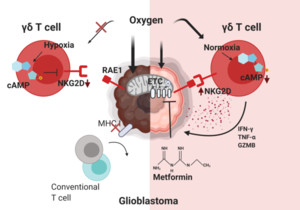![Investigation of the mechanism of anti-brain tumor immune response of gamma delta T cells. [사진=연구재단 제공]](https://i0.wp.com/cdn.hellodd.com/news/photo/202102/91743_303144_5132.png?w=560&ssl=1)
Brain tumors are known to have a very poor prognosis. In particular, glioblastoma, a malignant brain tumor, has a short average survival period of 1 to 2 years. There is no cure for it. Among them, researchers in Korea have found a process in which brain tumor cells eat up surrounding oxygen and neutralize immune cells. The method of preventing the inflow of oxygen to brain tumor cells that proliferate and rapidly consume surrounding oxygen is expected to be a clue to complement the low reactivity of immune chemotherapy drugs.
The Korea Research Foundation (Chairman Noh Jeong-hye) announced on the 16th that the research team of KAIST Professor Heung-gyu Lee identified the process of lowering the immune response of gamma delta (γδ) T cells due to excessive oxygen consumption by malignant brain tumor cells. Gamma delta T cells are congenital T cells that mainly exist in mucous membranes such as skin or intestines, and are known as important cells in the early removal of stressed cells or infection with bacteria.
The research team found that the higher the malignancy of the brain tumor, the less the gamma delta T cells enter the tumor, and the hypoxic environment is severe. On the other hand, the more gamma delta T cells were introduced, the better the patient prognosis was.
The research team hypothesized that the immune response would be normalized if the hypoxic environment was solved to supply adequate oxygen to gamma delta T cells and help the cells survive. In fact, gamma delta T cells have a receptor (NKG2D) that directly recognizes a ligand (NKG2DL) that occurs on the surface of brain tumor cells exposed to stress, which attracted attention as a new subject of immune response against tumors, but did not produce the effect as expected. .
When the research team administered a compound (metformin) with gamma delta T cells to block excessive oxygen metabolism of brain tumors in a real brain tumor mouse model, the penetration of immune cells into the tumor tissue increased and survival rate improved. This means that the anti-tumor immune response improved when the hypoxic environment of gamma delta T cells was resolved.
This research, which was conducted with the support of the biomedical technology development project (next-generation bio business) promoted by the Ministry of Science, ICT, and Korea Research Foundation, and the Samsung Future Technology Promotion Foundation, was published in’Nature Immunology’, an international academic journal in the field of immunology. Was published. In addition, Nature Immunology introduced this paper in the News & Views section.
Send SNS article
